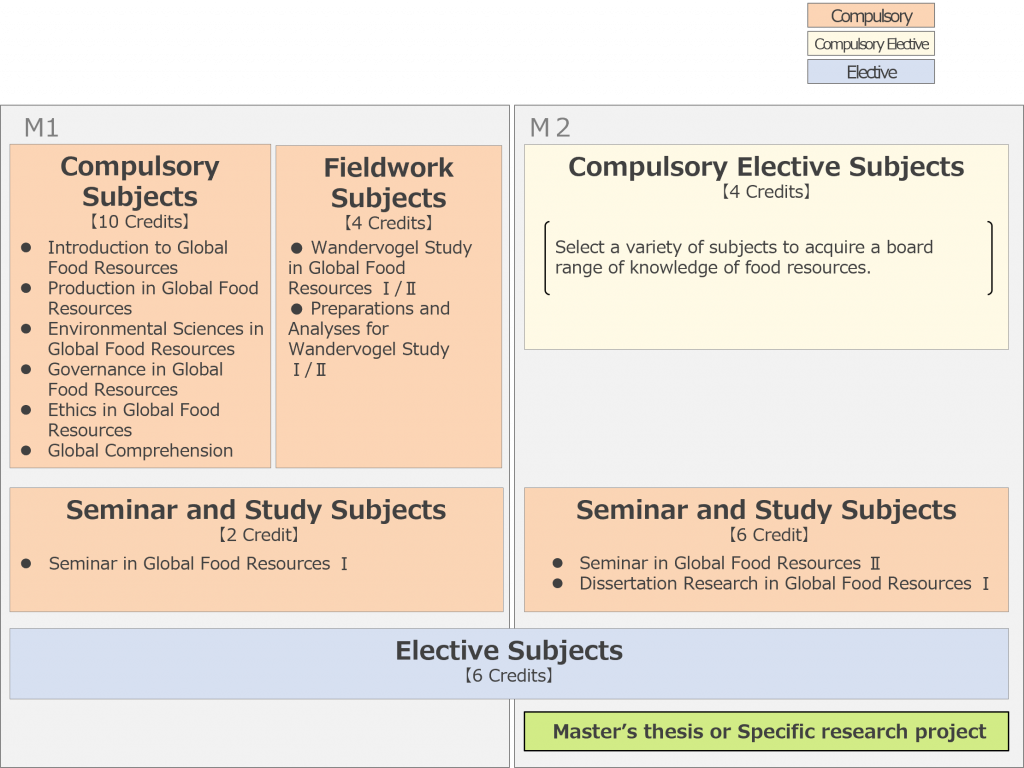The Master’s Course
Master’s Course
Curriculum and requirements for completion
To foster individuals with extensive knowledge and expertise who can understand diverse, multi-layered food resource issues and propose/implement specific solutions, comprehensive compulsory, compulsory elective and elective subjects are provided from the perspectives of “Production,” “Environment” and “Governance”.
To graduate, students are requried to attend the school for two years or longer, earn at least 32 credits, including at least 22 credits in compulsory subjects and at least 4 credits in compulsory elective subjects, and pass an examination and test concerning their thesis and specific research project. Students who have completed the master’s degree program of the Graduate School of Global Food Resources are awarded the degree of Master of Food Resources in accordance with the Hokkaido University Regulations concerning Academic Degrees.
Subjects provided
| Subject classfication | Subject name | No. of credits | No. of credits required for completion | |
|---|---|---|---|---|
| Compulsory Subjects (13 subjects) |
General Subjects (6 subjects) |
Introduction to Global Food Resources Production in Global Food Resources Environmental Sciences in Global Food Resources Governance in Global Food Resources Ethics in Global Food Resources Global Comprehension |
2 2 2 2 1 1 |
At least 22 credits |
| Fieldwork Subjects (4 credits) |
Wandervogel Study in Global Food Resources I Preparations and Analyses for Wandervogel Study I Wandervogel Study in Global Food Resources II Preparations and Analyses for Wandervogel Study II |
1
1 1 1 |
||
| Seminar and Study Subjects (3 credits) |
Seminar in Global Food Resources I Seminar in Global Food Resources II Dissertation Research in Global Food Resources I |
2 2 4 |
||
| Compulsory Elective Subjects (6 credits) |
Technology for Sustainable Agriculture Food Resources and HealthEnvironmental Science Environmental Management Analytical Economics Comparative Rural Sociology |
1 1 1 1 1 1 |
At least 4 credits | |
| Elective Subjects (16 credits) |
Leadership and Career Skills in Global Food Resources Research Communication in Global Food Resources Fundamental Sciences for the Students from Arts and Humanities Special Lecture on Global Food Resources I Special Lecture on Global Food Resources II Special Seminar on Global Food Resources I Special Seminar on Global Food Resources II |
1 1 2 [1] [2] [1] [2] |
||
| Special Lecture in Global Food Resources | Biotechnology in Global Food and Resources Diversity in Agriculture Water-energy-food Nexus Economic Policy Food and Gastronomy Sustainable Fisheries Management Agricultural Resource Economics |
1 1 1 1 1 1 1 |
||
| Special Topics in Global Food Resources | Viticulture, Enology and Wine Marketing Political History of Rural Community |
1 1 |
||
| Total | At least 32 credits | |||
Master’s thesis and Research on a specific theme
For completion, students are required to write a master’s thesis or specific research project. Students will choose one in consultation with their supervisor and other faculty members by the end of the first year.
| Master’s thesis | Research on a specific theme |
|---|---|
| Students conduct an investigation, experiment and research on a specific food resources issue, and compile the results and achievements as a master’s thesis. | Students conduct fieldwork and a case study on a specific food resources issue based on the results of Wandervogel Studies and Seminars. They work on the analysis and evaluation of the issue, seek/create a solution and propose it to society before compiling the results as a research report. |
Model of subjects taken (example)

Master’s Course
Campus Life
| Year | Season | Events |
|---|---|---|
| 1st | Spring | Entrance ceremony and guidance session for new students Beginning of classes University festival Selection of supervisors by students (provisional decision) |
| Summer | Wandervogel StudyⅠ Summer vacation |
|
| Fall | – | |
| Winter | Wandervogel Study Ⅱ Winter vacation End of classes Selection of supervisors by students (final decision) Selection of research for master’s thesis or research on specific issues |
|
| 2nd | Spring | Beginning of classes University festival Beginning of research for master’s thesis or research on specific issues |
| Summer | Summer vacation | |
| Fall | – | |
| Winter | Winter vacation End of classes Review of results of research for master’s thesis or research on specific issues Commencement ceremony |

